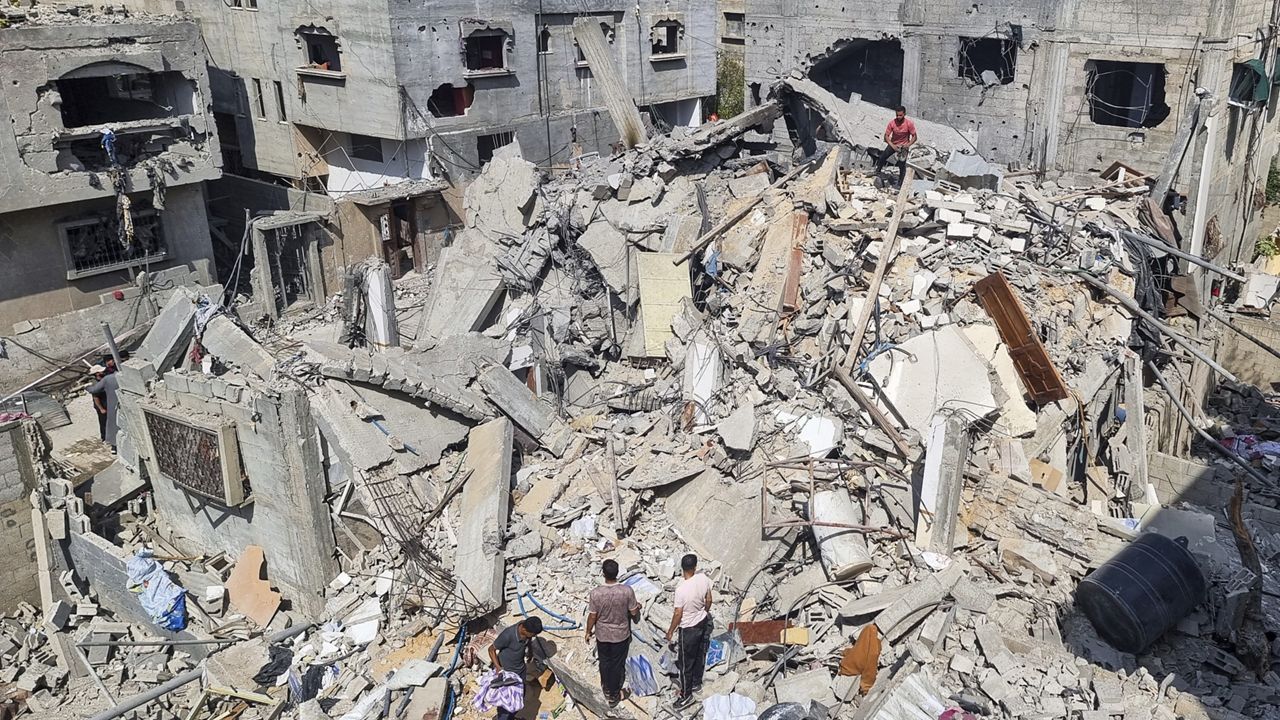Israeli airstrikes on the southern Gaza city of Rafah have killed at least 22 people, including six women and five children, Palestinian health officials say. One of the children killed in the strikes overnight into Monday was just 5 days old.
Israel has regularly carried out airstrikes on Rafah since the start of the war and has threatened to send in ground troops, saying Rafah is the last major Hamas stronghold in the coastal enclave. Over a million Palestinians have sought refuge in the city on the Egyptian border. The United States and others have urged Israel not to invade, fearing a humanitarian catastrophe.
The overnight strikes hit three family homes. The first killed 11 people, including four siblings aged 9 to 27, according to records at the Abu Yousef al-Najjar Hospital, where the bodies were taken. The second strike killed eight people, including a 33-year-old father and his 5-day-old boy, according to hospital records. The third strike killed three siblings, aged 23, 19 and 12. An Associated Press reporter saw the bodies at the hospital.
Israel blames the high civilian death toll on Hamas because the militants fight in densely populated areas. But the military rarely accounts for individual strikes, which often kill women and children.
The White House on Sunday said President Joe Biden had again spoken with Israeli Prime Minister Benjamin Netanyahu as pressure builds on Israel and Hamas to reach a deal that would free some Israeli hostages and bring a cease-fire in the nearly seven-month-long war in Gaza.
The White House said that Biden reiterated his “clear position” as Israel plans to invade Gaza’s southernmost city of Rafah despite global concern for more than 1 million Palestinians sheltering there. The U.S. opposes the invasion on humanitarian grounds, straining relations between the allies. Israel is among the countries U.S. Secretary of State Antony Blinken will visit as he returns to the Middle East on Monday.
Biden also stressed that progress in delivery of humanitarian aid to Gaza be “sustained and enhanced,” according to the statement. The call lasted just under an hour, and they agreed the onus remains on Hamas to accept the latest offer in negotiations, according to a U.S. official who spoke on condition of anonymity because the official wasn't authorized to comment publicly. There was no comment from Netanyahu's office.
A senior official from key intermediary Qatar, meanwhile, urged Israel and Hamas to show “more commitment and more seriousness" in negotiations. Qatar, which hosts Hamas' headquarters in Doha, was instrumental along with the U.S. and Egypt in helping negotiate a brief halt to the fighting in November that led to the release of dozens of hostages. But in a sign of frustration, Qatar this month said that it was reassessing its role.
An Israeli delegation is expected in Egypt in the coming days to discuss the latest proposals in negotiations, and senior Hamas official Basem Naim said in a message to The Associated Press that a delegation from the militant group will also head to Cairo. Egypt’s state-owned Al Qahera News satellite television channel said that the delegation would arrive on Monday.
The growing pressure for Hamas and Israel to reach a cease-fire deal is also meant to avert an Israeli attack on Rafah. Israel has massed dozens of tanks and armored vehicles. The planned incursion has raised global alarm.
“Only a small strike is all it takes to force everyone to leave Palestine," Palestinian President Mahmoud Abbas asserted to the opening session of the World Economic Forum in Saudi Arabia, adding that he believed an invasion would happen within days.
But White House national security spokesman John Kirby told ABC that Israel "assured us they won’t go into Rafah until we’ve had a chance to really share our perspectives and concerns with them. So, we’ll see where that goes.”
The Israeli troop buildup may also be a pressure tactic on Hamas in talks. Israel sees Rafah as Hamas’ last major stronghold. It vows to destroy the group's military and governing capabilities.
Aid groups have warned that an invasion of Rafah would worsen the already desperate humanitarian situation in Gaza, where hunger is widespread. About 400 tons of aid arrived Sunday at the Israeli port of Ashdod — the largest shipment yet by sea via Cyprus — according to the United Arab Emirates. It wasn't immediately clear how or when it would be delivered into Gaza.



